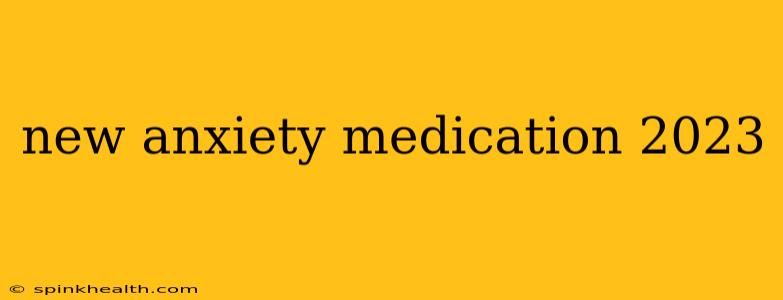Navigating the World of New Anxiety Medications in 2023: A Story of Hope and Understanding
Anxiety. That persistent, gnawing feeling of unease, the racing heart, the shortness of breath – it touches millions. And for many, finding the right path to managing anxiety means exploring the landscape of available medications. 2023 has seen continued advancements, offering new options and refinements to existing treatments. This isn't about a magic bullet, but about understanding the evolving choices and finding the best fit for your journey to well-being.
My own journey with anxiety began subtly, a low hum of worry that gradually grew into a roaring crescendo. The usual coping mechanisms – exercise, meditation – started to falter. It was then I realized I needed professional help, and that meant considering medication. The sheer number of options felt overwhelming, a daunting task like navigating a dense forest without a map.
This article aims to illuminate that path, drawing upon current research and experiences to provide a clearer understanding of new and evolving anxiety medication options in 2023. Remember, this isn't a substitute for professional advice. Always consult your doctor or psychiatrist before starting any new medication.
What are some new anxiety medications approved in 2023?
This is a crucial question, and unfortunately, there isn't a simple list of "brand new" anxiety medications approved specifically in 2023 that are radically different from what came before. The pharmaceutical landscape evolves incrementally. Instead of entirely new medications, we've seen refinements and new applications of existing drug classes. For example, research continues into optimizing dosages and delivery methods to improve effectiveness and minimize side effects. Furthermore, there's an ongoing exploration of combining different medications or therapies for a more personalized approach. This is where the advancements are truly happening.
What are the different types of anxiety medications available?
Understanding the different types of anxiety medications is crucial. The primary categories include:
-
Selective Serotonin Reuptake Inhibitors (SSRIs): These are frequently prescribed and work by increasing serotonin levels in the brain, a neurotransmitter crucial for mood regulation. Examples include sertraline (Zoloft), fluoxetine (Prozac), and escitalopram (Lexapro). While not new in 2023, ongoing research explores their optimal use and combination with other therapies.
-
Serotonin-Norepinephrine Reuptake Inhibitors (SNRIs): Similar to SSRIs, but also affect norepinephrine levels, another neurotransmitter involved in mood and focus. Venlafaxine (Effexor) and duloxetine (Cymbalta) are common examples. Again, current research centers on refining their use and understanding their long-term effects.
-
Benzodiazepines: These are fast-acting medications used for short-term relief of severe anxiety symptoms. They are often prescribed for situational anxiety or panic attacks. However, they are typically not recommended for long-term use due to the risk of dependence. Examples include alprazolam (Xanax) and lorazepam (Ativan).
-
Buspirone: This medication works differently than SSRIs and SNRIs and is often prescribed for generalized anxiety disorder (GAD). It's known for its relatively lower risk of side effects compared to other options.
Are there any new non-medication treatments for anxiety in 2023?
While this article focuses on medication, it's vital to remember that a holistic approach is often best. Alongside medication, many find relief through:
-
Therapy: Cognitive Behavioral Therapy (CBT) and other therapeutic approaches are incredibly effective in managing anxiety. These techniques help individuals identify and change negative thought patterns and behaviors.
-
Lifestyle Changes: Regular exercise, mindfulness practices, improved sleep hygiene, and a healthy diet can significantly impact anxiety levels.
-
Support Groups: Connecting with others facing similar challenges can provide invaluable support and validation.
What are the potential side effects of new anxiety medications?
Side effects vary widely depending on the medication and individual. Common side effects can include nausea, headaches, drowsiness, weight changes, and sexual dysfunction. It's crucial to discuss potential side effects with your doctor before starting any medication. Open communication is key to finding a medication that effectively manages your anxiety with manageable side effects.
How long does it take for new anxiety medication to work?
This is another highly individualized question. It can take several weeks, even months, to experience the full therapeutic benefits of many anxiety medications. Consistency is key; don't get discouraged if you don't see immediate results. Work closely with your doctor to monitor your progress and adjust your treatment plan as needed.
The Takeaway:
The journey to managing anxiety is personal and often involves a process of trial and error. 2023 offers refinements and better understanding of existing treatments, rather than entirely new categories of drugs. The most important thing is open communication with your healthcare provider to create a personalized plan that incorporates medication, therapy, and lifestyle changes. Remember, hope is within reach, and finding the right path to managing anxiety is possible. Your journey towards a calmer, more fulfilling life begins with that first step—seeking professional guidance.

